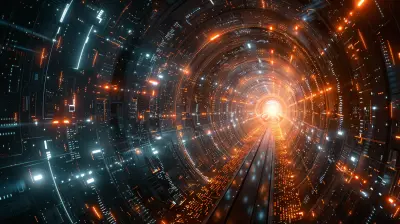How Quantum Computing Will Transform the Future of Energy Systems
9 August 2025
Quantum computing. Sounds like something straight out of a sci-fi movie, right? But here’s the kicker — it’s not just coming, it’s already starting to shake things up. While classical computers have done a decent job of helping us manage energy systems, quantum computers bring a whole new level of power and speed to the equation. And when it comes to solving some of the world’s most complex energy problems? Let’s just say, quantum might be the superhero we didn’t know we needed.
So buckle up, because we’re diving into how quantum computing is poised to revolutionize energy systems — from power grids and battery technologies to climate modeling and resource optimization. We’ll break it down in a way that actually makes sense, skip the jargon overload, and show you why this tech is a game-changer you should care about.
What Is Quantum Computing, Really?
Before we get too deep into the energy stuff, let’s cover the basics.Quantum computing is an entirely different beast compared to the computers you use every day. Instead of using bits (which are either 1 or 0), quantum computers use qubits. These qubits can be both 1 and 0 at the same time (a property called superposition), and they can be linked together through something called entanglement. Sounds wild? It is. But what that means in practical terms is quantum computers can process massive amounts of data and solve complex problems way faster than classical computers.
Why does this matter for energy systems? Because energy systems are some of the most complex networks on the planet. From managing supply and demand to predicting weather impacts on renewable energy — there’s a lot to handle. And quantum computing might just be the secret sauce to handle it all with precision.
Traditional vs Quantum: Where Classical Computing Falls Short
Classical computers struggle with optimization problems when the variables get too large or too interconnected. Think of it like trying to solve a 10,000-piece puzzle, only you’re blindfolded and someone keeps moving the pieces around. That’s what managing global energy systems feels like with today's technology.Here are a few areas where classical computing hits the wall:
- Grid optimization: Managing supply and demand across vast, distributed energy networks.
- Battery design: Simulating the behavior of molecules at the quantum level to design better materials.
- Climate modeling: Processing the long-term effects of policy changes or natural events at a granular level.
- Resource allocation: Determining the most efficient, sustainable ways to allocate resources globally.
Quantum computing has the potential to break through those walls, offering faster and more accurate solutions.
Reimagining Power Grids with Quantum Computing
Let’s talk power grids — the vast, complex systems that bring electricity into our homes and businesses. These grids are getting more complex by the day, especially with the addition of renewable energy sources like solar and wind. They’re less predictable than traditional sources, which makes balancing energy supply and demand a juggling act.So how can quantum computing help?
1. Real-Time Grid Optimization
Quantum algorithms can crunch the numbers on a mind-boggling scale, which means they could help utilities make real-time decisions about where to send power. For example, if there's a sudden dip in solar energy production due to cloud cover, a quantum computer could instantly find the best way to reroute power without causing a blackout or overload.2. Managing Decentralized Energy Sources
With more people installing solar panels and home batteries, the grid is becoming more decentralized. Quantum computing can help model and manage these interactions in real time, ensuring balance and efficiency.3. Redefining Demand Forecasting
Predicting how much energy people will use — and when — is crucial. Quantum-enhanced machine learning models could dramatically improve demand forecasting accuracy, especially during unpredictable situations like extreme weather events.
Designing the Next-Gen Batteries
One of the biggest bottlenecks in clean energy adoption? Battery technology.Let’s face it: batteries today are still relatively inefficient, expensive, and packed with materials that aren’t exactly Earth-friendly. To build the next generation of batteries, researchers need to understand how different materials behave at the atomic level — which is where quantum computers shine.
1. Simulating Molecular Behavior
Quantum computers can simulate quantum systems (like molecules) much more naturally than classical ones. This can lead to discovering better materials for batteries — ones that charge faster, last longer, and are safer to use.Imagine creating a battery that can power a car for 1,000 miles on a single charge, and then recharge in five minutes. Sounds like magic? With quantum simulation, that dream gets a lot closer to reality.
2. Reducing Trial-and-Error Research
Right now, battery development is a slow and expensive process. Researchers try thousands of combinations of materials to find one that might work. Quantum computing can cut through the noise and point scientists toward the most promising candidates from the start.Tackling Climate Change with Quantum Precision
Energy systems and climate modeling go hand-in-hand. The better we understand the climate, the better we can plan our energy use — and vice versa.Quantum computers could help us create far more accurate climate models, factoring in thousands of interdependent variables like ocean currents, atmospheric chemical reactions, and human behavior patterns. This could lead to:
- More effective climate policies
- Better preparation for natural disasters
- Improved insight into renewable energy potential
You can think of it like upgrading from a sketch to a full-blown HD video of the Earth’s climate system. More details, better outcomes.
Revolutionizing Renewable Energy Integration
Renewable energy is the future — we all know that. But integrating it into our existing infrastructure? That's where the real challenge lies.Quantum computing can play a massive role in this transition by:
1. Enhancing Weather Predictions
Since weather heavily affects renewable sources, better forecasts mean better energy planning. Quantum machine learning can help generate hyper-localized, ultra-accurate weather predictions — think Google Maps, but for wind and sunlight.2. Solving Storage Challenges
Renewables generate energy when nature wants, not necessarily when we need it. Solving this storage problem means improving battery tech (we’ve covered that) and optimizing when and where to store or release energy. Quantum optimization algorithms can do this nearly in real-time.3. Optimizing Distribution Networks
Quantum algorithms can help reconfigure how energy is distributed across long distances, reducing energy loss and improving efficiency. That means more of that solar energy from Arizona making it to your outlet in New York.Smarter Energy Trading and Market Optimization
Energy markets are like massive stock exchanges but for electricity. Prices can change every five minutes, depending on supply, demand, and hundreds of other factors.Quantum computing can bring clarity to this chaos by:
- Rapidly analyzing market conditions
- Suggesting optimal trade decisions
- Forecasting future market trends with higher precision
This isn’t just good news for big utility companies — it could eventually lead to more stable energy prices for consumers too.
Quantum and AI: A Power Couple for Energy Efficiency
Combine quantum computing with artificial intelligence, and you’ve got a powerhouse duo. AI is already being used in energy systems — from smart thermostats to predictive maintenance on power lines. Now imagine that AI being trained and deployed on quantum-powered systems.That’s like giving a regular robot Tony Stark’s Iron Man suit.
It means:
- Faster decision-making
- Better predictive analytics
- More intelligent automation
This could lead to entirely autonomous energy systems that adjust themselves continuously for maximum efficiency and sustainability.
Quantum Challenges: We’re Not There Yet
Alright, let’s not get ahead of ourselves. As promising as quantum technology is, it's still in its early stages. The hardware is notoriously fragile, and scaling up qubits while maintaining stability (known as quantum coherence) is a big challenge.But here’s the thing — the breakthroughs are coming fast. Big tech giants like Google, IBM, and Microsoft are pouring billions into quantum research. And startups across the globe are racing to solve these issues too. It’s not a question of "if" quantum computing will revolutionize energy — it’s a matter of "when".
Final Thoughts: The Quantum Leap Ahead
Look, the energy challenges we face aren’t going to get smaller, and the systems we use aren't getting any simpler. Traditional computing is starting to tap out. But quantum computing? It promises to turn the impossible into the inevitable.From building batteries that make electric cars dirt cheap, to predicting energy needs down to the minute, to integrating massive amounts of renewable energy without breaking the grid — the potential here is off the charts.
Quantum computing isn’t just another tech buzzword. It’s a fundamental shift in how we solve problems. And when it comes to our global energy future, that shift might be exactly what we need to light the way.
all images in this post were generated using AI tools
Category:
Quantum ComputingAuthor:

Adeline Taylor
Discussion
rate this article
1 comments
Zorina Cox
This article effectively highlights the potential of quantum computing to revolutionize energy systems, but it could benefit from more concrete examples of real-world applications and challenges.
August 29, 2025 at 3:05 AM

Adeline Taylor
Thank you for your feedback! I appreciate your suggestion and will look to include more concrete examples in future discussions on the topic.


